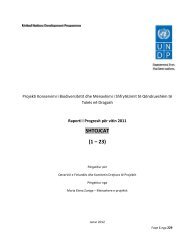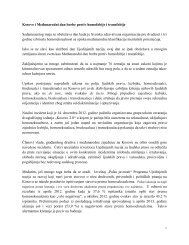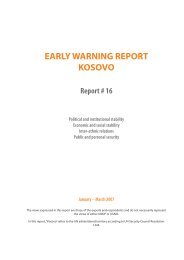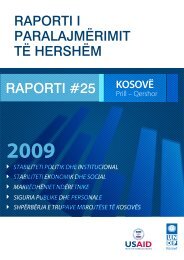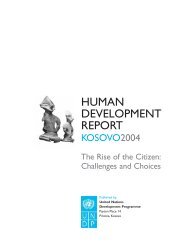Kosovo Human Development Report 2010 - UNDP Kosovo - United ...
Kosovo Human Development Report 2010 - UNDP Kosovo - United ...
Kosovo Human Development Report 2010 - UNDP Kosovo - United ...
You also want an ePaper? Increase the reach of your titles
YUMPU automatically turns print PDFs into web optimized ePapers that Google loves.
1.1<br />
Social inclusion/<br />
exclusion: evolution<br />
of the concept in<br />
Europe<br />
What is social exclusion? There are<br />
currently multiple definitions. However,<br />
each one emphasizes a process<br />
through which deprivation is driven<br />
by alienation from the mainstream -<br />
locking individuals or groups out of<br />
normal economic, social and political<br />
processes.<br />
From this perspective, social exclusion<br />
is both a process and an outcome.<br />
The process occurs when the<br />
institutions and social constructs that<br />
allocate resources and assign value<br />
operate in ways that systematically<br />
deny some groups full participation in<br />
society. 14 The outcome is “a complex<br />
and dynamic set of relationships that<br />
prevent individuals or groups from accessing<br />
resources and asserting their<br />
rights”. 15<br />
Rooted in French and German sociology,<br />
16 social exclusion is a largely European<br />
construct. In France, the term<br />
“social exclusion“ was first used in the<br />
1970s to refer to the plight of those<br />
who fell through the net of social protection<br />
- the poor, people with mental<br />
and physical disabilities, as well as racial<br />
and ethnic minorities. In early debates<br />
on social exclusion and marginality,<br />
social exclusion was usually nar-<br />
CHAPTER 1<br />
Social inclusion and human development<br />
a conceptual background 13<br />
“The obvious is the most difficult to see: The true wealth of a country is its people.”<br />
Mahbub ul Haq, founder of the <strong>Human</strong> <strong>Development</strong> <strong>Report</strong>s<br />
rowly viewed as individual-level challenge<br />
experienced by some individuals<br />
17 who were not able to participate<br />
in mainstream society. As the concept<br />
evolved, it started to include societal,<br />
institutional, policy and cultural barriers<br />
as well as individual-specific challenges.<br />
When the European Commission<br />
(EC) adopted the term in the late<br />
1980s, social exclusion as a concept<br />
was finally absorbed into Europe’s internal<br />
political discourse. 18 Over time,<br />
it became understood as both a relative<br />
and absolute concept. Exclusion<br />
can only be judged by comparing<br />
the circumstances of an individual (or<br />
group or community) relative to others<br />
within the same society. However, the<br />
individual’s right to “a life associated<br />
with being a member of a community”<br />
is fundamental, transcending borders<br />
and different socio-cultural norms. 19<br />
When first introduced into the EU<br />
policy discourse, the concept of social<br />
inclusion posited participation in<br />
the labour force as the primary nexus<br />
of social interaction. The concept understood<br />
social exclusion in terms of<br />
exclusion from the paid labour force<br />
and explicitly assigned an active obligation<br />
to the State to identify and<br />
remove barriers to full participation<br />
in paid employment and to regularly<br />
report on its progress. The adoption of<br />
the Lisbon Strategy in 2000, however,<br />
SOCIAL INCLUSION AND HUMAN DEVELOPMENT - A CONCEPTUAL BACKGROUND<br />
| 23




